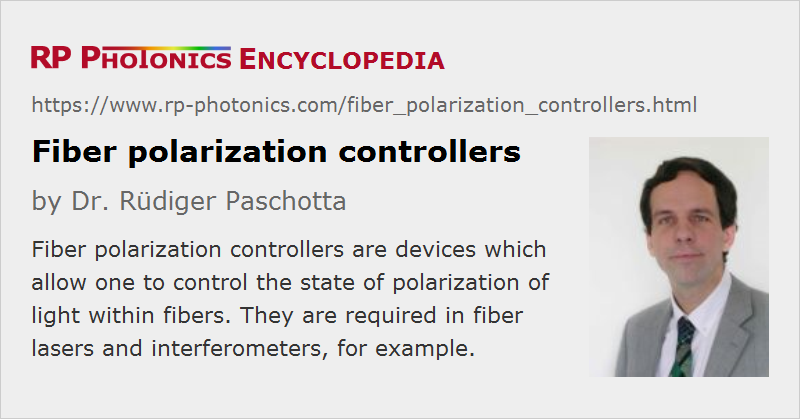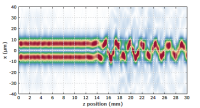Fiber Polarization Controllers
Definition: devices which allow one to control the state of polarization of light within fibers
More general term: polarization controllers
German: Faser-Polarisationseinsteller, Polarisationsregler
Categories: fiber optics and waveguides, photonic devices
How to cite the article; suggest additional literature
Author: Dr. Rüdiger Paschotta
Various fiber-optic devices such as interferometers require an adjustable state of polarization of light in a fiber. For that purpose, different types of fiber polarization controllers have been developed.
Bat Ear Controllers with Bent Fibers
A popular type of fiber polarization controller exploits the birefringence which is induced by bending (coiling) a fiber. The total retardation (amount of birefringence) is proportional to the length of fiber and inversely proportional to its bending radius. It also depends on the fiber type. Some simple holders allow to arrange for some number of fiber turns with a given bending diameter, so that effectively a λ / 2 or λ / 4 retardation is achieved, for example.

Frequently, one uses three such coils (“bat ears”) in a sequence, where the middle coil acts as a half waveplate and the outer ones as quarter waveplates. Each coil can be rotated around an axis in line with the input and output fibers. By adjusting the orientation of all three coils, one can transform a given input state polarization at a fixed wavelength into any output state of polarization. Note, however, that the effect on the polarization has some wavelength dependence. For high peak powers, as often occur with ultrashort pulses, there can also be nonlinear polarization rotations.
The diameters of the fiber coils should not be too small, as otherwise the bending would cause excessive bend losses.
A more compact variant, which is also less sensitive to nonlinear effects, uses strongly birefringent (polarization-maintaining) fibers instead of fiber coils.
Polarization Controllers with Squeezed Fibers
One can realize an effective variable waveplate with a device which allows one to squeeze some length of fiber with a variable amount of pressure. By rotating the squeezed bit of fiber around its axis while keeping the fiber clamped in some distance from the squeezed part, one can obtain an arbitrary output state of polarization. In effect, one achieves the same as with a Babinet–Soleil compensator (a bulk-optical device containing two birefringent wedges), although the operation principle is different.
It is also possible to use several squeezing sections in series, where only the pressure but no rotation angle is varied. This variant may also be equipped with piezo-electric transducers. That kind of device can also serve as a polarization scrambler, when the piezos are driven with different frequencies or random signals.
Suppliers
The RP Photonics Buyer's Guide contains 9 suppliers for fiber polarization controllers.
Questions and Comments from Users
Here you can submit questions and comments. As far as they get accepted by the author, they will appear above this paragraph together with the author’s answer. The author will decide on acceptance based on certain criteria. Essentially, the issue must be of sufficiently broad interest.
Please do not enter personal data here; we would otherwise delete it soon. (See also our privacy declaration.) If you wish to receive personal feedback or consultancy from the author, please contact him e.g. via e-mail.
By submitting the information, you give your consent to the potential publication of your inputs on our website according to our rules. (If you later retract your consent, we will delete those inputs.) As your inputs are first reviewed by the author, they may be published with some delay.
See also: fibers, polarization-maintaining fibers, polarization of light, birefringence, waveplates, nonlinear polarization rotation
and other articles in the categories fiber optics and waveguides, photonic devices
 |







If you like this page, please share the link with your friends and colleagues, e.g. via social media:
These sharing buttons are implemented in a privacy-friendly way!